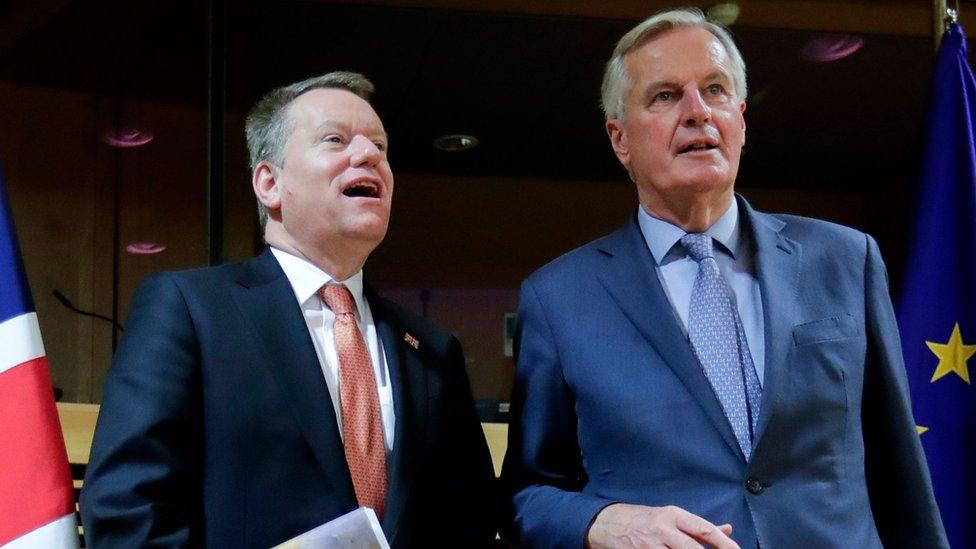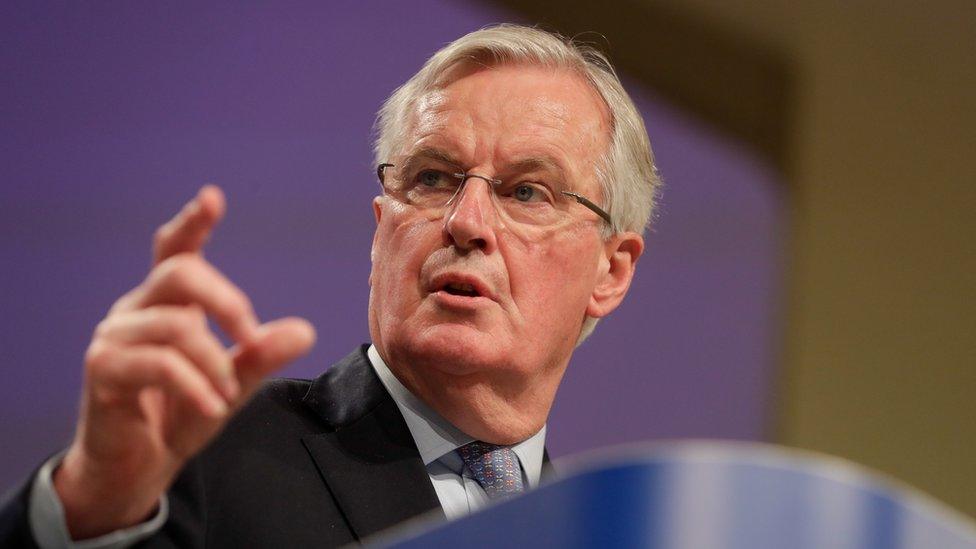EU-UK Brexit talks: Differences clear after first week
- Published

UK lead negotiator David Frost (L) appeared with EU chief negotiator Michel Barnier when the talks started on Monday
More than 100 British negotiators are heading home from Brussels after the first week of talks with the EU over the future relationship with the UK.
The two sides sound quite positive and appear to agree on some technicalities in areas like transport and energy.
But there are some big disagreements about some big things.
The two sides agree that their new free trade agreement should include measures to ensure fair economic competition between them.
The EU wants this to be done by referring to current EU standards in some policy areas - which are also UK standards - for now. They would be used as a "reference point" to judge whether future standards had changed or not.
Allow X content?
This article contains content provided by X. We ask for your permission before anything is loaded, as they may be using cookies and other technologies. You may want to read X’s cookie policy, external and privacy policy, external before accepting. To view this content choose ‘accept and continue’.

The UK sees this as being asked to follow EU rules in perpetuity - "dynamic alignment by another name", said a British official. The Brits also think it would prove impossible to work out in five or 10 years' time whether new EU and British rules were similar or not.
Law enforcement
If the sensitive personal data of EU citizens, such as DNA or criminal records, is going to be shared with the UK for crime-fighting purposes, then the EU wants the European Court of Justice (ECJ) to be the ultimate arbiter of the rules.
The EU also wants the European Convention on Human Rights (ECHR) to apply.
Confused by Brexit jargon? Reality Check unpacks the basics.

The UK does not want the ECJ to be mentioned anywhere in any deal. It also says that committing to the ECHR in an international agreement ties the government's hands at a time when it's carrying out its own review into the operation of human rights law in the UK.
Governance: One deal or many?
The UK says most countries interact with the EU via a series of separate agreements covering individual policy areas. Individual agreements come with their own terms and conditions and means of settling disputes. This would be the easiest way to manage different areas which have different needs, London argues.
The EU wants one large agreement with a standard mechanism for settling disagreements, with the option of referring questions of EU law to the European Court of Justice. This would be the easiest way to manage different areas with different needs, Brussels argues. It would also be easier to get through the European Parliament and national parliaments.
It might sound like a pedantic row but it's a binary choice with no room for compromise, which means it could collapse the whole process.
Fish
This is turning out to be a big disagreement.
The EU wants to "uphold" its current rights to fish in British waters, and for those rights to be protected for several years. In theory, this is to give some predictability to a precarious industry.
Why Dutch fishing crews worry over Brexit losses
It also thinks this would avoid having to have annual negotiations over all the fish stocks that exist in British and European waters, which would be impractical.
The UK wants to apply a different model called zonal attachment, where the UK would have full control over access to its waters.
A senior EU official suggested that European governments would have to decide whether to change their approach if the UK doesn't change its position.
The UK suspects the EU is still operating under assumptions from the Theresa May era. EU diplomats fears the UK is preparing to walk out in a few months' time, and to blame it on Brussels.
Separately, the Joint Committee that oversees the Withdrawal Agreement will have its first meeting on 30 March. The EU is demanding proof that the UK is implementing the Ireland protocol, which requires special treatment for Northern Ireland.
Looming over it all is the threat of disruption from coronavirus. The negotiating teams haven't discussed what they would do in that case.
But they have stopped shaking hands, just in case.
- Published5 March 2020
